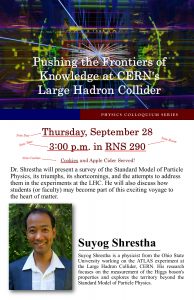Monday, September 25
MSCS Colloquium:
Not All Fun & Games: Challenges of Professional Game Development &
Tests and Containerized Deployment for HiPerCiC3 Applications
Speakers: Omar Shehata ’18 & Hugo Valent ’19, St. Olaf Computer Science Majors
RNS 310, 3:30 pm
Everyone Welcome
Tuesday, September 26
No Events
Wednesday, September 27
No Events
Thursday, September 28
Physics Seminar: Pushing the Frontiers of Knowledge at CERN’s Large Hadron Collider
Speaker: Suyog Shrestha, a Physicist from the Ohio State University working on the ATLAS experiment at the Large Hadron Collider, CERN, Geneva, Switzerland.
3:00 pm, RNS 290 (note atypical day, time and room number)
***********************************************************************************
Chemistry Seminar: Therapeutic Delivery of Hydrogen Sulfide: Small Molecules, Polymers, and Materials
John Matson, Virginia Tech
Abstract: Despite its reputation as a foul-smelling and toxic pollutant, hydrogen sulfide (H2S) is a vital biological signaling agent, and it is of interest as a therapeutic for a variety of diseases and conditions. We focus on developing new small molecules, polymers, and supramolecular materials for the delivery of hydrogen sulfide H2S. The majority of biological studies on this gasotransmitter have been carried out with systemically administered sulfide salts, which have no tissue specificity, fast release, and the potential for off-target effects. We address these shortcomings by developing new H2S-releasing small molecules with controllable triggers and release kinetics. These small molecules are then incorporated into new materials, which can offer localized H2S delivery with tunable kinetics. Our platforms include soluble polymers and peptide-based gels designed to release therapeutically relevant concentrations of H2S with controllable kinetics. We focus on using these materials as therapeutics for treating cardiovascular disease and cancer.
3:15 pm, RNS 390
Friday, September 29
MSCS Research Seminar: An Introduction to Hypercyclicity
Speaker: David Walmsley, St. Olaf Visiting Mathematics Professor
Abstract:
It is a remarkable fact that every complex differentiable function can be uniformly approximated on any compact subset of the complex plane by certain derivatives of a \textit{single} such function. Said differently, there exists a complex differentiable function whose successive derivatives form a dense sequence in the space of all complex differentiable functions. This is an example of \textit{hypercyclicity}, where the iterates of a natural action (in this case, the iterates of the derivative) applied to a vector produces a dense sequence. In this introductory talk, we will give several historical examples of hypercyclicity and discuss a useful criterion that can be used to show that this phenomenon of hypercyclicity exists.
Time, Place: RNS 204, 3:40 pm, Everyone Welcome

